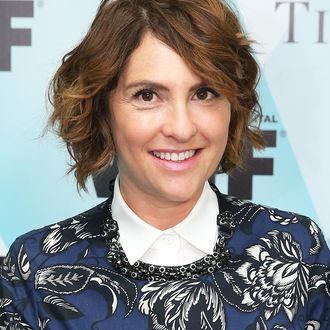
Last month, Transparent’s Jill Soloway gave a powerful message of solidarity to female creators at the Women in Film Awards, and this weekend, at Wifey.tv’s run of female-directed shorts at Los Angeles’s Cinefamily Theater, she doubled down on the theme. After warning the audience that she “[gets] more and more proselytize-y every day and people probably want me to shut up,” Soloway launched into a speech about what she calls “the state of emergency for the female voice.” The problem, as she sees it, is the male gaze; no matter how progressive a male filmmaker may be, his camera will always be creating more empathy for his male subjects. The only way to combat this, Soloway says, is for women to pick up a camera and not let the forces of insecurity and self-consciousness get them down. “There is a real all-out attack on us having subjectivity, so I just beg everybody to be relentless in their pursuit of their voice,” she told the crowd. “The insecurities are always going to be there. Notice them when you’re there writing, when you’re trying to get your thing out there, when you’re setting up your night where you’re showing your films. It’s always going to be there. The world, the matriarchal revolution, is dependent on female voices and speaking out loud.”
Read Soloway’s full speech below, courtesy of The Movable Feast:
I recently have woken up to the state of emergency when it comes to the female voice that we’re currently in. I think maybe two or three years ago I would’ve potentially said, “Men, it’s not really their fault [that] they have all the directing jobs. They’re not doing it on purpose. They have less to do than women, so they have more time on their hands.”
Then I really started thinking about how the male gaze is a privilege perpetuator. In the Roger Ebert documentary [“Life Itself”], he talks about films being an empathy machine, so whoever the protagonist is, they’re going to have empathy and when men are making movies about men, they’re creating more empathy for the male gaze. So the male gaze, because the men are subjects, necessarily divides us, divides women into either/or —the madonna or the whore, the slut or the good girl or the many, many ways in which women are divided to be seen as objects when the male character is the subject. That divide is kind of a wound that’s really harming our entire planet right now. The divided feminine is the issue. The wounded masculine divides us to feel power and when we reclaim that, we repair the divided feminine by speaking and having voices and by picking up the camera.
Obviously, besides trying to bring other women into your work, when you pick up the camera and share your voice, it heals the world. It’s not funny anymore what’s going on with us. It’s immoral, the way that we are kept from our voices. It’s not just a matter of our numbers. There is a real all-out attack on us having subjectivity, so I just beg everybody to be relentless in their pursuit of their voice, and also to be aware that even with all of the success I have where you’d feel I’m confident and I could do anything, I’m still constantly ashamed of myself. That speech I gave at Women in Film? Two days before, I asked them not to film it because I was scared. I wake up in the middle of the night thinking, “Don’t do what you’re doing. Don’t write that thing.” I feel this way all the time. So I just want all the female creators to keep an eye out for that thing that says don’t do it, it’s not good enough, it’s not ready and you’re not right, and know that that’s the uninvited guest that’s always going to be there in your unconsciousness. That’s a product of growing up other, of growing up as not the subject. You think there’s something wrong with your voice all the time.
And we are ashamed for having desire in our culture. Women are shamed for having desire for anything — for food, for sex, for anything. We’re asked to only be the object for other people’s desire. There’s nothing that directing is about more than desire. It’s like, “I want to see this. I want to see it with this person. I want to change it. I want to change it again.” It’s like directing is female desire over and over again, and film is the capturing of human emotions and somehow men were able to swindle us into believing that that is their specialty. All they told us our whole life is we’re too emotional to do any real jobs, yet they’ve taken the most emotional job, which is art making about human emotions and said we’re not capable of it. I just want to make sure you know I’m always plagued by insecurities. The insecurities are always going to be there. Notice them when you’re there writing, when you’re trying to get your thing out there, when you’re setting up your night where you’re showing your films. It’s always going to be there. The world, the matriarchal revolution, is dependent on female voices and speaking out loud. Please keep making things.





